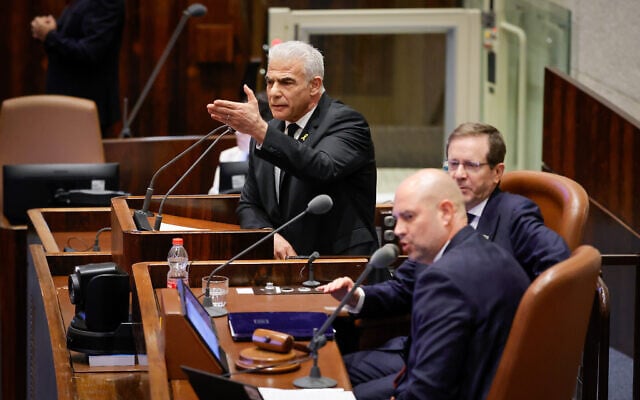In an embarrassment to Prime Minister Benjamin Netanyahu, right-wing lawmakers voted on Wednesday to pass, in its preliminary reading, a bill that would apply Israeli sovereignty to all West Bank settlements — as well as another, more limited bill to annex a major city-settlement — despite opposition from Netanyahu and most of his Likud party to announcing such a move at this time.
The bills must still pass three additional votes in the plenum and will now be referred to the Knesset Foreign Affairs and Defense Committee for further consideration. It is highly unlikely that Netanyahu will allow either of the two bills to pass into law.
All but one Likud lawmaker boycotted the votes. MK Yuli Edelstein broke ranks to vote in favor, casting a decisive vote and helping the bill to annex all settlements scrape by 25-24.
In a statement, Edelstein said that he supported the measure because “Israeli sovereignty in all parts of our homeland is the order of the day,” and called on “all Zionist factions to vote in favor.”
In reaction, Likud decided to remove Edelstein from his seat on the Knesset Foreign Affairs and Defense Committee, a spokesperson for the lawmaker confirmed to The Times of Israel.
The initial approval of the annexation legislation came as US Vice President JD Vance was visiting Israel, and could potentially cause friction with Donald Trump’s administration, which has opposed annexation.

Sponsored by far-right MK Avi Maoz of the one-man Noam party — which was part of the coalition until it left earlier this year — the broader bill requires Israel to “apply its laws and sovereignty to the areas of settlement in Judea and Samaria to establish the status of these areas as an inseparable part of the sovereign State of Israel.”
“The Holy One, blessed be He, gave the people of Israel the Land of Israel. Settlement in the Land of Israel is the redemption and national revival, settlement is what makes the Land of Israel flourish after two thousand years of exile,” Maoz told lawmakers ahead of the vote.

“In applying sovereignty to Judea and Samaria, we are making a correction that is long overdue. Since the government has been procrastinating, our job as members of Knesset is to do this,” he added.
The bill was supported by the coalition’s far-right Otzma Yehudit and Religious Zionism parties, while the opposition United Torah Judaism party — which was until recently in the coalition — was split down the middle.
Speaking with The Times of Israel, Motti Babchik, a senior adviser to UTJ chairman Yitzhak Goldknopf, said that UTJ’s Agudat Yisrael faction had supported the bill in an effort to highlight the hypocrisy of Netanyahu’s right-wing government, many of whose ministers have recently called for annexation.
In a statement, UTJ’s Degel HaTorah faction said it would vote against the measure, arguing that “proposals to declare sovereignty at this time are putting us in conflict with the countries of the world, and especially with the United States.”

Lawmakers belonging to fellow ultra-Orthodox party Shas were not present for the vote, while MKs from the opposition Yesh Atid party opposed the bill.
Education Minister Yoav Kisch (Likud) spoke out against the bill ahead of the vote, telling lawmakers that while he was “a great believer in applying sovereignty,” the issue cannot be advanced through opposition bills and the government “will lead toward sovereignty together with our American partners.”
Separate bill to annex Ma’ale Adumim
A more limited annexation bill, sponsored by Yisrael Beytenu party chairman Avigdor Liberman of the opposition, also passed, by a vote of 32-9, in a preliminary reading. Liberman’s bill calls to apply sovereignty to the West Bank settlement of Ma’ale Adumim near Jerusalem, which the government is actively working to expand.

Addressing the plenum, Liberman said that the best way to advance annexation was through limited steps, stating that “Ma’ale Adumim constitutes the broadest consensus in Israeli society. In terms of applying sovereignty, it is better to go for the broadest national consensus[such as] Ma’ale Adumim, Ariel, Gush Etzion and the Jordan Valley.”
“The coalition tried to stop and stifle the move and failed,” he later boasted. “They fled the plenum to avoid voting, but Yisrael Beytenu did not give up, and together — we succeeded.”
Proud supporters
National Security Minister Itamar Ben Gvir said that he was “proud” that his Otzma Yehudit party had “voted in favor of sovereignty on this “historic day.”
Addressing his coalition partners in Likud, the ultranationalist minister said that he understood “that there is pressure on you, international pressure. But the right-wing government is doing what is right for the residents of the State of Israel. And what is right for the residents of the State of Israel is sovereignty now.”
The bills’ advancement was also welcomed by the Yesha Council, the umbrella body for West Bank settlements, stating that it “expects Likud Knesset members to join this process and advance the sovereignty plan in accordance with the party’s spirit.”

The fact that “it is the opposition that pushes for sovereignty is unacceptable,” Yesha Council chief Israel Ganz stated, calling “on the coalition in the Knesset and the government to take responsibility for these laws and to advance full sovereignty as soon as possible.”
Both Opposition Leader Yair Lapid and Blue and White party chairman Benny Gantz voted in favor of Liberman’s bill, drawing criticism from the left-wing Peace Now organization, which accused them of going against the wishes of their voters and launching “a political attack against the Trump administration and our other friends in the world, which also jeopardizes the fragile ceasefire.”
Speaking with The Times of Israel on condition of anonymity, an opposition source boasted that “the opposition dictated the agenda today, caused cracks in the coalition, showed how weak the prime minister is, made it clear to everyone that there is a minority government in Israel and that’s the job of an opposition.”
A political stunt
In a statement, Netanyahu’s Likud party dismissed the bills as opposition “trolling… aimed at damaging our relations with the US and Israel’s great achievements in the campaign” in Gaza.
“We strengthen settlement every day with actions, budgets, construction, industry, and not with words,” the party said, insisting that “true sovereignty will be achieved not with a show-off law for the protocol, but by working properly on the ground and creating the political conditions appropriate for the recognition of our sovereignty, as was done in the Golan Heights and in Jerusalem.”

Members of Netanyahu’s coalition have been loudly calling to advance annexation as a response to the recognition of a Palestinian state by Western powers last month. In early September, Finance Minister Bezalel Smotrich publicly called to annex 82 percent of the West Bank, even as the United Arab Emirates warned that such a move would spell the end of Israel’s integration into the Middle East.
Other senior members of the cabinet, including Justice Minister Yariv Levin and Defense Minister Israel Katz, have also endorsed annexation. This summer, the Knesset overwhelmingly approved a non-binding motion in favor of applying Israeli sovereignty in the West Bank.
However, Trump has ruled out such a move, stating last month that he will not allow Israel to annex the West Bank — prompting Netanyahu’s coalition allies to insist that the premier ignore Washington.
The Prime Minister’s Office is concerned that efforts to annex the West Bank could spark a diplomatic crisis with Washington, the Kan public broadcaster reported last week.
The idea of applying sovereignty in the West Bank is incredibly popular and “there is a majority in the Knesset to annex today,” one coalition insider told The Times of Israel on Thursday.

“The reason it’s not on the agenda is because Netanyahu has made it very clear that he’s not going to support anything of the sort. You can say it’s because of Trump,” the source explained. “You can say it’s because of his own fear of global isolation or a regional war or whoever knows what it is that he’s thinking. But if there was a secret ballot in the Knesset today, a majority would definitely annex.”
On Sunday, the Ministerial Committee for Legislation declined to advance an annexation bill sponsored by Otzma Yehudit MK Limor Son Har-Melech.
Asked last week if she was concerned that passing annexation legislation could lead to problems between Jerusalem and Washington, Har-Melech replied that “with all due respect to President Trump, the people of Israel are the masters and sovereigns in their own land, and the role of the president of the United States is to ensure that this remains so — not, heaven forbid, the opposite.”

